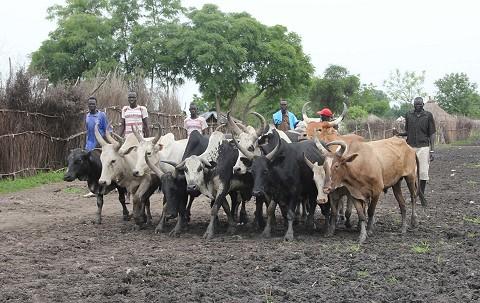Jonglei state cattle raiding violence
October 17, 2012 (BOR) – Raiders have stole 415 cattle from Mading Adiang cattle camp in Ajuong payam [district] of Jonglei’s Twic East county on Tuesday according to commissioner Dau Akoi.

Akoi said the army have been stationed in the payam for protection.
He explained that the footprints of the cattle indicate that the raiders came from Gumuruk payam of Pibor county.
He said that it was first such incident since an anti-hostility agreement was signed in May and urged the county authorities of Pibor and the Jonglei government to ensure that the cattle are returned to their rightful owners.
A statewide disarmament programme and negotiations led to a reduction in insecurity in the state, however spate of cattle raiding incidents culminated in 200 deaths in the state in March.
SPLA soldier killed in Jonglei cattle raiding violence
In a separate incident in Jale payam also in Jonglei’s Bor county, a South Sudan army (SPLA) soldier was reported killed and two others wounded in an attempted raid on Weereh cattle camp, east of Jale village.
In a press briefing at Bor County commissioner’s office on Wednesday, county press secretary, David Alier Keer told the press that one SPLA soldier was shot dead and two others were injured by armed members of the Murle ethnic group when a small force was assaulted by raiders who laid an ambush in the bush where the cattle grazing.
“Some civilians were wounded and they are now in Bor hospital,” Keer added.
Last Week, the state governor, Kuol Manyang Juuk told Sudan Tribune that some of the cattle raided from Jale payam of Bor county, in August were looted by the rebel loyalist of David Yau Yau.
The claim was strongly disputed by the local Member of Parliament (MP) Kuol Bol Ayom (commonly known as Adur-Hok-nok), who represents Athoch-nortj constituency, which Jale payam lies within.
Yau Yau is the head of an armed rebel group which the Juba government claims receives backing from Khartoum.
“The people who are killing people here, looting cattle and abducting children have economic reasons, while David Yau Yau has political reasons of fighting against the government. How are these related now?” asked Ayom.
Bol added that the raiders, who he also claimed are also abducting children, “are getting guns and ammunition from the rebels to fulfill their economic agenda”.
Bol said that “there is no no different between Yau Yau and Murle”.
He blamed the forces of disarmament for having failed to disarm the Murle during the dry season.
“Now the SPLA is saying they are not able to disarm them in the wet season, what is the right time for them to be disarmed? During the dry season, SPLA said they they were not able to reach the Murle Youth who escaped, and now they say there is water everywhere, which time is the best for them to disarm Murle?,” asked Bol.
Yau Yau is a member of the Murle ethnic group. There has been scant information from the Murle Diaspora and the Murle in South Sudan on their perspective of the conflict in Jonglei state, unlike the vocal Luo-Nuer who claim that the Murle have been driven to abducting their children as they are suffering from an infertility endemic; a view shared by the country’s president, Salva Kiir.
According to the UN Environmental Program the Murle were in Ethiopia until the 19th century. Some remained there until the 1990s while others were driven west by local Nilotes. They established an homeland in Pibor county, Jonglei state in the 1930s, since which, environmental pressures have impinged upon their pastoralist lifestyle.
Little evidence can be found to support the infertility claim. However, the motivation to rationalise the denigration of one of South Sudan’s pariah ethnic groups, in order to legitimise the attribution of blame, is self-evident.
In September the SPLA spokesperson, Philip Aguer Panyang, reacted to claims that Yau Yau’s troops had been receiving air-dropped military assistance, saying that “the proof is beyond doubt. We have been informing the public about Khartoum arming all mercenaries and militias in South Sudan.”
Juba and Khartoum have, on numerous occasions, accused one another of backing their respective rebel groups.
However, there are now those speaking about the Murle in a less accusatory tone. Jonglei state MP Judi Jonglei Boyuris, on 13 October rejected what he calls the South Sudan army’s (SPLA) treatment of members of the Murle ethnic group “as enemies.”
Contrary to Bol’s opinion, Boyuris described a distinction between Yau Yau and the Murle as a whole.
(ST)
